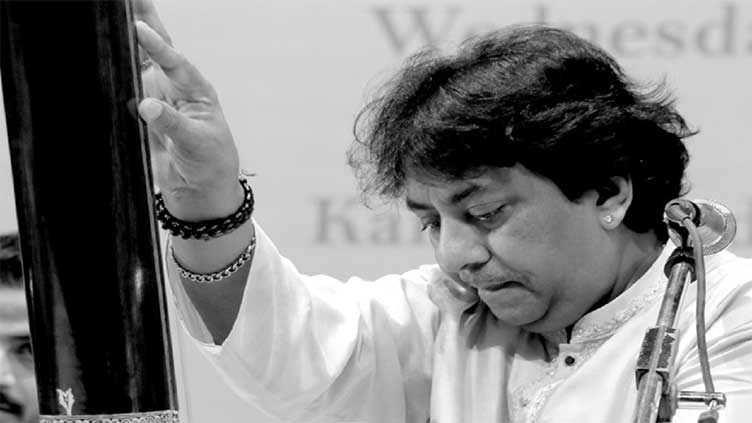Music maestro Ustad Rashid Khan dies at 55

Entertainment
He leaves behind legacy in classical music
(Web Desk) - Rashid Khan, aged 55, passed away on Tuesday after valiantly battling cancer for over four years.
He is survived by his son, two daughters, and wife.
Possibly the last living legend of Rampur Sahaswan gayaki (style of singing), Rashid Khan was recognised as the 31st generation of Sangeet Samrat Mian Tansen, as detailed on his official website.
Known for his mastery in the ‘Vilambit Khayal’ gayaki, he captivated millions of Hindustani vocal classical music enthusiasts for more than three decades.
Born in Badayun, Uttar Pradesh, Rashid Khan's initial training was under his maternal grand-uncle, Ustad Nissar Hussain Khan.
In April 1980, he relocated to Kolkata at the age of 10 when Nissar Hussain Khan moved there with his grandfather.
Rashid Khan's debut concert took place when he was just 11, and by 1994, he had gained recognition as a musician.
Deeply influenced by Hindustani classical music from an early age, Rashid Khan commenced his music lessons under the guidance of his grandparent, Inayat Hussain Khan.
In the realm of musical traditions, the Rampur-Sahaswan gayaki shares a close kinship with the Gwalior gharana. This particular style is defined by its medium-slow tempos, richly resonant voice, and intricate rhythmic play.
Rashid Khan weaves together a narrative deeply influenced by maestros such as Ustad Amir Khan and Pandit Bhimsen Joshi.
Proficient in the art of the tarana, much like his guru Nissar Hussain, he infused his renditions with a distinctive personal touch.
While excelling in Hindustani vocals, Rashid Khan also showcased his proficiency in playback music, contributing to blockbusters such as “My Name is Khan,” “Jab We Met,” “Isaaq,” “Manto,” “Mausam,” “Bapi Bari Ja,” “Kadambari,” and “Mitin Masi.”
Rashid Khan was recognised for his innovative approach, blending Hindustani vocals with genres like Sufi and collaborating with Western instrumentalist icon Louis Banks. He engaged in ‘jugalbandis’ with sitar artist Shahid Parvez.
Khan's Rabindra Sangeet (songs of Rabindranath Tagore) album, ‘Baithaki Rabi,’ released in the mid-2000s, showcased his versatility.


